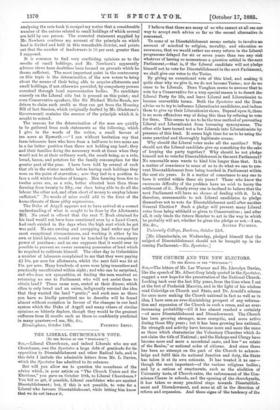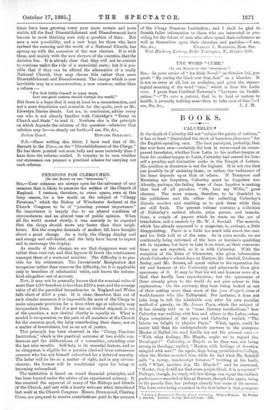THE CHURCH AND THE NEW ELECTORS.
pro nue iDITOR OF THE "SPECTATOR."] Sin,—The letters of Mr. Lee Warner and Mr. Llewelyn Davies,. like the speech orMr. Albert Grey lately quoted in the Spectator, suggest a new hope for the preservation of the National Church. Looking back over the last fifty years, from the time when I eat at the feet of Frederick Maurice, and in the light of his wisdom read Coleridge on Church and State, and Dr. Arnold's scheme for once more making the Church national in fact as well as in idea, I have seen an ever-diminishing prospect of any reforma- tion and expansion of the Church in such a sense, and an ever- increasing probability—till it has almost reached a certainty —of mere Disestablishment and Disendowment. The Church has been growing stronger, more energetic, and more active during those fifty years ; but it has been growing less national. Its strength and activity have become more and more the same as those which characterise the Voluntary Churches which do not claim the title of National ; and the Bishops and Clergy have become more and more a sacerdotal caste, and less "an estate of the Realm," or national order of citizens. And since there has been no attempt on the part of the Church to acknow- ledge and fulfil this its national fanction and duty, the State has taken it at its own estimate. It has treated it tts one— though the most important—of the various religious bodies ; and by a serious of enactments, such as the abolition of University tests, of Church-rates, the enforcement of the Con- science Clause in schools, and the opening of the churchyards,. it has taken so many practical steps towards Disestablish- meat and Disendowment, and none at all in the direction of reform and expansion. And these signs of the tendency of the
times have been growing every year more certain and more visible, till the final Disestablishment and Disendownient have become to most thinking men only a question of time. But now a new possibility, and a new hope for those who have realised the meaning and the worth of a National Church, has simung up with the accession of the new electors. It is with them, and mainly with the new electors of the counties, that the decision lies. It is already clear that they will not be content to continue under the role of a sacerdotal caste ; but it is pos- sible that if they can be offered the alternative of . a really National Church, they may choose this rather than mere Diseetablishment and Disendowment. The change which is now inevitable may be a reconstruction, a new creation, rather than a reform :—
" for God fulfils himself in many ways,
Lest one good custom should corrupt the world."
Bat there is a hope that it may at least be a reconstruction, and not a mere dissolution and scramble for the spoils, such as Mr. Llewelyn Davies dreads. Let me, in conclusion, advise every one who is not already familiar with Coleridge's "Essay on Church and State" to read it. Nowhere else is the principle on which depends the solution of the question—whatever that solution may be—so clearly set forth.—r am, Sir; &c.,.
P.S.—Since writing this letter, I have read that of Mr. Barnett in the Times, on the "Diseetablishment of the Clergy." He has there pointed out more fully and more incisively than I have done the reforms needed. It remains to be seen whether our statesmen. can prepare a practical scheme for carrying out suchzeforms. •



































 Previous page
Previous page